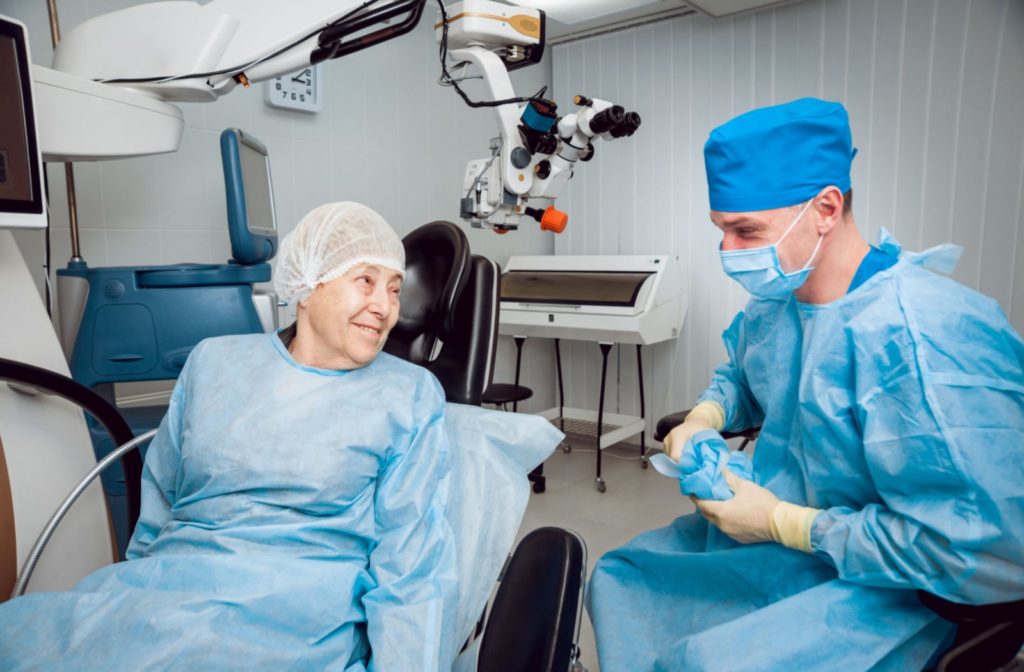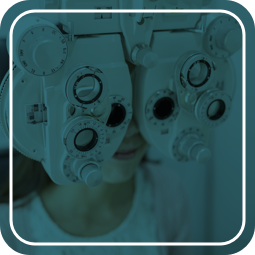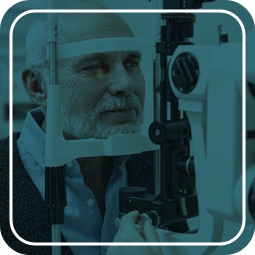As you age, cataracts can develop and progressively cloud your vision. Your optometrist typically does not recommend surgery in the early stages; however, as cataracts progress and your vision becomes affected, surgery may be the only option to restore your vision.
While the exact time may vary, cataract surgery typically takes no longer than an hour, with relatively basic steps required for preparation and recovery. Beginning with a consultation, your optometrist will assess your eyes in a comprehensive exam to determine whether the eye diseases affecting your eyes are at the stage when surgery is necessary to improve your quality of life.
Do You Need Cataract Surgery?
Cataract surgery is a common procedure to improve visual clarity and is often done when cataracts cause vision loss. The timing for surgical intervention may vary depending on how the vision loss affects each individual. Generally, the lens in your eye is cloudy due to protein clumping, which typically develops slowly over a number of years. In rare instances, the opacities can create a rapid decline in vision. As vision loss progresses, there are a number of other potential causes that may coincide or masquerade as a cataract. It is important for your optometrist and ophthalmologist to rule out any of these potential complications prior to moving forward with the surgery. This is why ongoing, routine eye examinations are critical when experiencing vision loss. After consultation with your optometrist, a referral to your local ophthalmologist can be initiated. The surgery will replace the natural lens with an artificial lens called an intraocular lens (IOL).
Early signs of cataracts typically don’t require surgical intervention, but they tend to get worse over time. Your optometrist will closely monitor your eyes and recommend surgery once you have noticeable trouble with everyday activities, such as driving, reading, or working at a screen.
Symptoms that may indicate you’re developing cataracts can include:
- Blurry vision
- Trouble with night vision
- Double vision
- Light halos
- Faded colours
- Light sensitivity
If you notice any symptoms, bring them up with your optometrist and they can review any changes in the health of your eyes. Your optometrist can also help with pre and post-operative care and review the risks and benefits of the procedure.

What to Expect Before Cataract Surgery
To prepare for cataract surgery, your ophthalmologist will perform tests to determine what type of IOL you need to improve your vision. Your eye care team will assess your unique case of cataracts to select a suitable surgical technique.
Before your surgery, the pre-operative care team may request that you:
- Use specialized eye drops
- Limit the use of certain medications
- Come to surgery on an empty stomach
- Clean your eyelashes and eyelids
You’ll need someone to come with you to drive you home after the surgery.
What to Expect During Cataract Surgery
The surgery is often a quick procedure, taking only about an hour. During the surgery, your surgeon will:
- Use numbing eye drops to prevent discomfort
- Use a tool or laser to create an incision at the front of your eye and the surface of your natural lens
- Use an ultrasound tool or laser to break up the clouded natural lens (cataract), then extract (suction) the broken-up tissue
- Place a new IOL through the incision to take the place of the natural lens
You’ll be awake during the procedure and won’t feel any pain. However, if you need help managing anxiety, your surgeon may give you a sedative to help you relax.
If you have cataracts in both eyes, your eye care team may recommend having the procedure done for both eyes on the same visit, or on separate appointments. Your eye care team will monitor your recovery the day after surgery and again one week and one month post-operatively. Many patients are able to see well enough to function one week after the surgery and 90% of the healing is complete after one month.
What to Expect After Cataract Surgery
Following your surgery, post-operative care may be provided to help monitor your eyes, and complying with your eye care team’s guidelines will be critical. They may recommend you:
- Wait to drive until your optometrist can assess your recovery
- Consider returning to work after 2-3 days after one eye is done, or 4-6 days if both eyes are done at the same time.
- Avoid exercise and activity until cleared by your optometrist
- Sleep on your back rather than your stomach or sides
- Wear the eye shields provide for overnight to avoid rubbing them in your sleep
Things to avoid following cataract surgery may include:
- Swimming
- Wearing eye makeup for a few weeks
- Using soap on your eyes
- Colouring your hair
- Using hot tubs, saunas, and steam rooms
- Gardening
Cataract surgery is one of the safest eye procedures, but there are risks, just like any surgery. During the preparation phase, your optometrist will review the risks with you, but you should seek care if you experience any of the following symptoms after your surgery:
- Vision loss or double vision
- Swelling
- Bleeding
- Signs of infection (ie: coloured, sticky discharge)
- Persistent light sensitivity that limits your ability to function throughout the day
- Pain that over-the-counter medication isn’t helping
Your optometrist will also look for any signs of retinal detachment and secondary cataracts in your follow-up care.
Get Ahead of Your Vision Problems
Age-related vision problems like cataracts may be detected early in eye exams. Contact us to schedule an appointment to assess your eye health.















